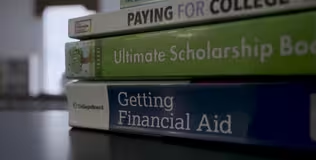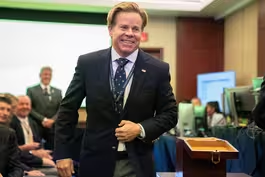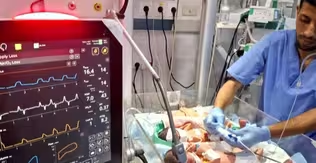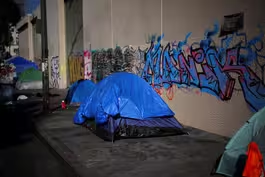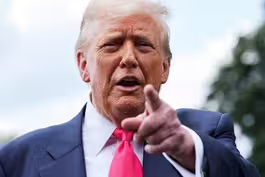
Trump ramps up pressure on Powell in Fed visit
Clip: 7/24/2025 | 8m 35sVideo has Closed Captions
Trump ramps up pressure on Powell to cut interest rates during visit to Federal Reserve
President Trump continued to dial up the pressure on Jerome Powell during a visit to the Fed. The president's public remarks and personal insults about Powell are a major departure from past presidents, and his approach has sparked questions about whether the Fed's independence could be undermined in the months ahead. Geoff Bennett discussed more with Julia Coronado of Macro Policy Perspectives.
Problems playing video? | Closed Captioning Feedback
Problems playing video? | Closed Captioning Feedback
Major corporate funding for the PBS News Hour is provided by BDO, BNSF, Consumer Cellular, American Cruise Lines, and Raymond James. Funding for the PBS NewsHour Weekend is provided by...

Trump ramps up pressure on Powell in Fed visit
Clip: 7/24/2025 | 8m 35sVideo has Closed Captions
President Trump continued to dial up the pressure on Jerome Powell during a visit to the Fed. The president's public remarks and personal insults about Powell are a major departure from past presidents, and his approach has sparked questions about whether the Fed's independence could be undermined in the months ahead. Geoff Bennett discussed more with Julia Coronado of Macro Policy Perspectives.
Problems playing video? | Closed Captioning Feedback
How to Watch PBS News Hour
PBS News Hour is available to stream on pbs.org and the free PBS App, available on iPhone, Apple TV, Android TV, Android smartphones, Amazon Fire TV, Amazon Fire Tablet, Roku, Samsung Smart TV, and Vizio.
Providing Support for PBS.org
Learn Moreabout PBS online sponsorshipAMNA NAWAZ: The president continued to dial up the pressure on Federal Reserve Chairman Jerome Powell during a visit to the Fed today.
President Trump has repeatedly floated the idea of getting rid of Powell and then backed off, but continues to press him to cut interest rates.
GEOFF BENNETT: The president's public remarks and personal insults about Powell are a major departure from past presidents, and his approach has sparked questions about whether the Fed's independence could be undermined in the months ahead.
Tensions were evident again today when the president and Powell got together late this afternoon in front of the cameras.
A sight not seen in modern times.
DONALD TRUMP, President of the United States: We're looking at the construction.
And we're with the chairman, as you know.
Chairman, come on over.
GEOFF BENNETT: President Trump arriving today at the Federal Reserve building.
Late this afternoon, the president visited the Fed's construction site, a building undergoing its first major renovation in nearly a century, amid intensifying criticism of Fed Chair Jerome Powell.
The tour had originally been planned for a handful of administration officials, including Budget Director Russell Vought.
But late last night, the White House announced that the president would be joining them.
The president and Powell today disagreeing in front of the press on the overall price tag for the renovation.
DONALD TRUMP: It looks like it's about $3.1 billion.
It went up a little bit or a lot.
So the 2.7 is now 3.1.
JEROME POWELL, Federal Reserve Chairman: I'm not aware of that, Mr. President.
DONALD TRUMP: Yes, it just came out.
JEROME POWELL: Yes, I haven't heard that from anybody at the Fed.
Oh, you're including the Martin renovation.
You just added an entire capital.
You just added in a third building, is what that is.
That's a third building.
(CROSSTALK) DONALD TRUMP: Well, I know.
But it's a building that's being built.
JEROME POWELL: No, it's been -- it was built five years ago.
We finished Martin five years ago.
DONALD TRUMP: It's part of the overall work.
JEROME POWELL: But that's not new.
DONALD TRUMP: So... GEOFF BENNETT: Some analysts believe the visit was less about bricks and beams and more about Powell.
President Trump has repeatedly expressed frustration with the Fed chair and is now using the project's $2.5 billion cost, nearly $700 million over a budget, as political ammunition.
QUESTION: As a real estate developer, what would you do with a project manager who would be over budget?
DONALD TRUMP: Generally speaking, what would I do?
I'd fire him.
GEOFF BENNETT: The Fed attributes the overruns to inflation in construction costs, toxic soil contamination and long overdue infrastructure upgrades, including asbestos removal, new utilities, a parking garage and historic preservation work.
Chair Powell has publicly defended the renovations and called for an independent inspector general to review the plans.
Still, it may not shield him from the president's ire.
Mr. Trump has made no secret of his desire to see Powell gone.
DONALD TRUMP: But we have a guy that's just a stubborn mule and a stupid person that is making a big mistake.
GEOFF BENNETT: Even today, the president continued to push for a steep interest rate cut.
DONALD TRUMP: Well, I'd love him to lower interest rates.
Other than that... GEOFF BENNETT: This year, the Fed has kept interest rates steady at 4.3 percent after three cuts in 2024.
Last month, Powell defended his approach before the House Financial Services Committee.
JEROME POWELL: Policy changes continue to evolve and their effects on the economy remain uncertain.
The effects of tariffs will depend, among other things, on their ultimate level.
GEOFF BENNETT: Legally firing Powell would be difficult.
The Supreme Court has affirmed that a Fed chair can only be removed for cause, such as misconduct or a violation of the law.
But if today's visit made one thing clear, it's this: The pressure campaign is only intensifying.
And, for more, we're joined now by Julia Coronado.
She's the founder and president of MacroPolicy Perspectives.
That's an independent market research firm.
And she's also professor of finance at the McCombs School of Business at the University of Texas, Austin.
Thanks for being back with us.
We appreciate it.
JULIA CORONADO, President, MacroPolicy Perspectives: It's my pleasure to be here.
GEOFF BENNETT: So react, if you will, to what you saw and heard from the president today at the Fed.
What do you make of it?
JULIA CORONADO: I mean, it's -- as you noted in the piece, it's unprecedented in modern times to see the president so openly and so persistently applying pressure on monetary policy.
It's a lesson that we learn from the '70s that doing so and forcing the Fed to be beholden to elected politicians can lead to inflation.
It can lead to weakness in the dollar and just bad trade-offs for the economy.
So it's a dangerous zone that we're in.
And Chair Powell is not the kind of man that will necessarily bow to that pressure, but his term only lasts through May of next year.
And then President Trump gets to name his replacement.
GEOFF BENNETT: It was striking to watch Powell push back on President Trump's assessment of the cost overruns, Powell in that moment in many ways asserting his independence and the independence of the Fed.
Talk more about the consequences if the Fed even loses the perception of being autonomous.
JULIA CORONADO: Yes, I mean, so the Fed sets short-term interest rates, but longer-term interest rates that determine things like mortgage rates and business borrowing rates are really a combination of what the Fed is doing and the credibility that it has over a longer horizon, what investors expect the Fed to do in terms of navigating and managing the U.S. economy.
So if the investors lose faith that the Fed will keep inflation under control over a longer horizon, even if the Fed cuts rates, you might actually see longer-term interest rates go higher.
And that's really where the pain lies.
We all, most consumers, we look at mortgage rates or auto loan rates or credit card rates.
And those are longer-term interest rates.
And so the credibility of the Fed is an essential ingredient to keeping those under control.
GEOFF BENNETT: Well, you almost answered my next question because I was going to ask you.
The president repeatedly today said that lowering interest rates would be a good thing for American homebuyers, people who are in the market to buy a home, it'd be a boon for the economy overall.
I mean, does he have a point?
Do economists tend to agree with him on that?
JULIA CORONADO: No.
No, we don't agree with him, because, again, those longer-term interest rates are a function not just of what the Fed is doing today, but how much we trust the Fed to keep those forces under control over a longer horizon.
So the more politicized the Fed becomes and responsive to political pressure, again, you could actually see the reverse of what the president wants to see, where the Fed cuts interest rates, but longer-term interest rates go higher because people expect more inflation down the road.
So it's not a simple, you can just lower interest rates and borrowing costs.
It really depends on the credibility of the monetary management framework.
It's something that we have learned hard, hard lessons about through our history.
And one of those lessons came in the '70s, and then that required double-digit interest rates to control inflation to bring it down in the early '80s, deep recession.
That is not where we want to be.
And so it's better to take a little pain in the near term to keep that inflation under control so that the economy is able to navigate on stable ground over a longer horizon.
And many administrations have given the Fed that independence over the last 40 years.
And now we're dancing close to the edge of losing that independence and the credibility that comes with it.
GEOFF BENNETT: Yes, just drawing on your experience as a professor and someone with deep knowledge of this kind of thing, I mean, executive branch efforts to influence the Fed are not new, maybe certainly not to the degree that President Trump is trying to do it.
GEOFF BENNETT: But if the Fed chair is not easily influenced, there might be people who would say, well, what's the harm?
What's the harm then of any of this, to which you would say what?
JULIA CORONADO: To which I would say the harm could be the credibility of the U.S. government, the full faith and credit that keeps our markets strong and our borrowing costs low.
GEOFF BENNETT: Julia Coronado, always great to speak with you.
Thanks for being with us.
JULIA CORONADO: My pleasure.
Crackdown on unpaid student loans could impact millions
Video has Closed Captions
Clip: 7/24/2025 | 8m 21s | How the government's crackdown on unpaid student loans could impact millions (8m 21s)
GOP Rep. Haridopolos recaps Trump's first 6 months
Video has Closed Captions
Clip: 7/24/2025 | 8m 23s | 'We kept our promises': Rep. Haridopolos touts GOP victories in Trump's first 6 months (8m 23s)
Inside Gaza’s neonatal wards where babies battle the odds
Video has Closed Captions
Clip: 7/24/2025 | 8m | Inside Gaza’s neonatal wards where babies born into a war zone battle the odds (8m)
News Wrap: Trump urges cities to clear homeless from streets
Video has Closed Captions
Clip: 7/24/2025 | 6m | News Wrap: Trump pushes cities to remove homeless people from streets (6m)
What Columbia's settlement means for higher education
Video has Closed Captions
Clip: 7/24/2025 | 8m 12s | What Columbia's settlement with the Trump administration means for higher education (8m 12s)
Why the DOJ met with Epstein accomplice Ghislaine Maxwell
Video has Closed Captions
Clip: 7/24/2025 | 4m 41s | Why the DOJ met with Ghislaine Maxwell amid backlash over Trump's Epstein ties (4m 41s)
Providing Support for PBS.org
Learn Moreabout PBS online sponsorshipSupport for PBS provided by:
Major corporate funding for the PBS News Hour is provided by BDO, BNSF, Consumer Cellular, American Cruise Lines, and Raymond James. Funding for the PBS NewsHour Weekend is provided by...
